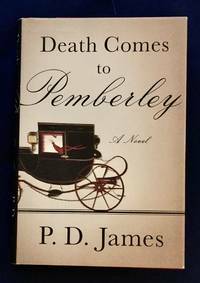Take a photo of a barcode or cover
There were so many structural problems to this book. The plot had no real rising and falling action; the climax was hardly climactic at all. The endcapping subplot also had no real conflict and therefore a bland "conclusion", and anyway it was in no way related to the murder mystery so it seemed pointless to add it in the first place. Details of the "case" were repeated often but no real new information was revealed until the last few chapters, when everything was dutifully explained within sitting rooms. There were no consequences for any of the characters (except the original victim and, perhaps, Mrs. Younge, who was a minor character).
Very plodding without the Elizabeth/Mr. Darcy chemistry to make it so romantic.
didnt hate it, it was fine, if plodding and unsurprising and uninspired. Meh.
Listened to this audiobook after watching the series. I was loving it until the mystery was getting told to us rather than shown. I felt the adaptation was better at creating suspense and drama. Loved getting the chance to be back in the Pride and Prejudice world, despite the lack of Austen’s flare. It’s a bit of fun, don’t come at it looking for a recreation of Austen’s style, you won’t find it. Just enjoy the slow journey around Pemberley for one last time.
A Jane Austen fanfic with too much badly-inserted historical exposition (which I enjoyed, mind, but the author wasn't even trying to wind it into the narrative).
First, let's talk about Jane Austen pastiche. You might think that I would like it; after all, I'm the girl who re-reads all 7 novels religiously every year or perhaps two if I'm deep in a Victoriana phase. Who would imagine that girl wouldn't want more Austen, amirite?
You'd be wrong. I've come to realize that longing for more Austen is not the same as accepting the drivel that issues from the pens of writers, both recognized and otherwise, who attempt to parse The Magnificent Seven into continuations of the romances that people who are not me believe are at the heart of Austen's work. Yes, you read that right: I don't think that Austen is about romance, or at least not entirely. Obviously everyone ends up properly paired at the end; she was writing for women, after all, and if there's one thing we know from the shelves of used bookstores everywhere, women love their proper pairings - particularly if they're accompanied by a little bodice-ripping. Bu Austen's most pointed references are to society and the manipulations that people utilize to get what they want - the end result isn't romance, but attainment of desire at the expense of those who value "society" above human truths.
And now, let's talk a little about this novel.
Elizabeth and Darcy are happily ensconced in Pemberley with their two boys and regular visits from Jane and Bingley. But before this all can be explained, James gives us the gossip's view of Pride & Prejudice, which is that Elizabeth is a conniving fortune-hunter and that Darcy was, well, conned.
When you start to wonder if a book will get any better by page ivx, maybe it's time to put it down. But I didn't put it down because I love me some Lizzy Bennet. More fool, me.
What follows is a laundry list of what this novel's problem is. Feel free to imagine me going all brown-girl on this book, waving my finger in the air to great effect while raising an eyebrow and saying things like, "aaaand another thing!" I may possibly be a Latina hair stylist in Washington Heights for the rest of this review.
- Elizabeth does not still have feelings for her sister's husband. She never really did, so pasting heart-flutterings onto her 6 years after her marriage to Darcy is... stupid.
- Darcy and Elizabeth hardly interact at all. They interact even less with their children, who are relegated to the nursery and only mentioned as plot points.
- Charlotte was blamed for Lady Catherine finding out about Darcy and Elizabeth's supposed engagement. To take a life-long friendship and reduce it to petty "domestic revenge" tarnishes both the friendship and the character unnecessarily.
- James tied in other Austen books. I know that Austen's books were all written and set around the same time period, but Highbury and Pemberley do not exist in the same world. Wickham working for the Elliotts is absurd, and Harriet Roberts nee Smith would never take in someone's bastard, even if it was the nephew of Mr. Darcy of Pemberley. Tying in other Austen characters smacks of inside jokes where none are necessary.
- Darcy is a laconic character. He never uses 200 words when 20 will do, and marrying Elizabeth wouldn't have suddenly turned him into Mr. Infodump. Phrases like "As you know, Magistrate, the sheriff's job is to..." should never fall from ANY character's lips - much less from Mr. Darcy's!
- Wickham is not a killer, and to try to paint him as a suspect just means that the inevitable acquittal is boooo-ring.
- Even more boooo-ring than the big reveal of the killer was the mutual explaining that Darcy and Elizabeth did in the last 20 pages of the text. They go on a walk and he proceeds to mansplain to her why he chose her and how she changed him, blah blah. It's as if James realized that her two major characters hadn't interacted in any significant way, then conveniently forgot that the confession scene in P&P ever happened.
Death Comes to Pemberley was my final attempt to enjoy Austen pastiche, and that enjoyment was a miserable failure. So authors, please take note: even if you're wicked famous and super-awesome, please don't use these (or ANY) characters to try to prop up your poorly conceived plot lines.
4 of 11 yellows
You'd be wrong. I've come to realize that longing for more Austen is not the same as accepting the drivel that issues from the pens of writers, both recognized and otherwise, who attempt to parse The Magnificent Seven into continuations of the romances that people who are not me believe are at the heart of Austen's work. Yes, you read that right: I don't think that Austen is about romance, or at least not entirely. Obviously everyone ends up properly paired at the end; she was writing for women, after all, and if there's one thing we know from the shelves of used bookstores everywhere, women love their proper pairings - particularly if they're accompanied by a little bodice-ripping. Bu Austen's most pointed references are to society and the manipulations that people utilize to get what they want - the end result isn't romance, but attainment of desire at the expense of those who value "society" above human truths.
And now, let's talk a little about this novel.
Spoiler
Elizabeth and Darcy are happily ensconced in Pemberley with their two boys and regular visits from Jane and Bingley. But before this all can be explained, James gives us the gossip's view of Pride & Prejudice, which is that Elizabeth is a conniving fortune-hunter and that Darcy was, well, conned.
When you start to wonder if a book will get any better by page ivx, maybe it's time to put it down. But I didn't put it down because I love me some Lizzy Bennet. More fool, me.
What follows is a laundry list of what this novel's problem is. Feel free to imagine me going all brown-girl on this book, waving my finger in the air to great effect while raising an eyebrow and saying things like, "aaaand another thing!" I may possibly be a Latina hair stylist in Washington Heights for the rest of this review.
- Elizabeth does not still have feelings for her sister's husband. She never really did, so pasting heart-flutterings onto her 6 years after her marriage to Darcy is... stupid.
- Darcy and Elizabeth hardly interact at all. They interact even less with their children, who are relegated to the nursery and only mentioned as plot points.
- Charlotte was blamed for Lady Catherine finding out about Darcy and Elizabeth's supposed engagement. To take a life-long friendship and reduce it to petty "domestic revenge" tarnishes both the friendship and the character unnecessarily.
- James tied in other Austen books. I know that Austen's books were all written and set around the same time period, but Highbury and Pemberley do not exist in the same world. Wickham working for the Elliotts is absurd, and Harriet Roberts nee Smith would never take in someone's bastard, even if it was the nephew of Mr. Darcy of Pemberley. Tying in other Austen characters smacks of inside jokes where none are necessary.
- Darcy is a laconic character. He never uses 200 words when 20 will do, and marrying Elizabeth wouldn't have suddenly turned him into Mr. Infodump. Phrases like "As you know, Magistrate, the sheriff's job is to..." should never fall from ANY character's lips - much less from Mr. Darcy's!
- Wickham is not a killer, and to try to paint him as a suspect just means that the inevitable acquittal is boooo-ring.
- Even more boooo-ring than the big reveal of the killer was the mutual explaining that Darcy and Elizabeth did in the last 20 pages of the text. They go on a walk and he proceeds to mansplain to her why he chose her and how she changed him, blah blah. It's as if James realized that her two major characters hadn't interacted in any significant way, then conveniently forgot that the confession scene in P&P ever happened.
Death Comes to Pemberley was my final attempt to enjoy Austen pastiche, and that enjoyment was a miserable failure. So authors, please take note: even if you're wicked famous and super-awesome, please don't use these (or ANY) characters to try to prop up your poorly conceived plot lines.
4 of 11 yellows
I need to stop reading books based on Austen books. Because none of them do a great job. Yes, you can sort of get the tone of dialogue right, but everything feels so cheesy and overstated in a way that Austen herself would never have done. And then the forced way in which the author makes reference to characters from other stories made me cringe.
Pretty much, I read this because it's a miniseries that PBS will have over the winter, but it's not necessarily one I'm glad I read in advance of watching.
Pretty much, I read this because it's a miniseries that PBS will have over the winter, but it's not necessarily one I'm glad I read in advance of watching.
I wanted to like this book. I really did. I watched and enjoyed the TV adaptation and thought that the storyline took Austen's characters to new and interesting places. But the book is frustrating- it gets bogged down in superfluous detail, goes on odd tangents, and has too much detail not necessary to moving the plot forwards. I was really struggling to stay with it. My tipping point came when the author blithely swept a handful of characters from Persuasion into the backstory (not a spoiler, just a brief mention) and for some reason that made me irrationally angry. It jolted me right out of the story, and I was having a hard enough time staying in it. So I threw in the towel. I wish I'd liked it enough to finish it but I just couldn't.
I enjoyed most of the story line, but it was a bit repetitive and didn't really characterize Elizabeth the way Austen did. I liked the characters and plot, and at the end the tie in to another of Austen's books, but the style wasn't my cup of tea. Still, it was enjoyable and I was happy to have figured out most but not all of the mystery.





